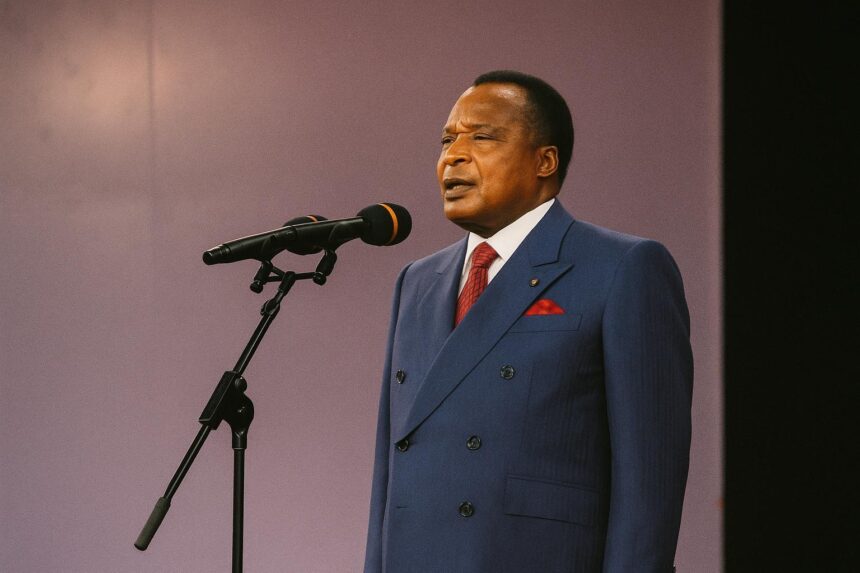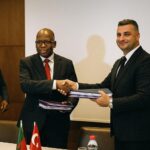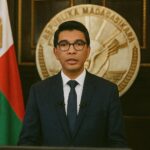Presidential Overture to a Continental Stage
With a deliberate cadence reminiscent of an orchestral downbeat, President Denis Sassou Nguesso declared the 12th Pan-African Music Festival officially open on 19 July while an audience of diplomats, scholars and artists filled every tier of Brazzaville’s Congress Palace. The head of state’s formulation, equal parts protocol and conviviality, underscored how music has become a venerable vector of public diplomacy for the Republic of the Congo. Government advisers note that the presidential presence establishes early narrative control: the festival is framed not merely as entertainment but as a strategic instrument for regional cohesion (Presidency of the Republic, 2025).
Youthful Resonance and Choreographic Ingenuity
Moments after the presidential declaration, the stage erupted in a cinematic sequence titled “Année de la jeunesse”. Nearly two hundred performers—slammers, percussionists, dancers—translated policy slogans into kinetic poetry. Slam artist Mariusca Moukengue’s staccato verses alternated with Black Panther’s baritone refrains while choreographer Gervais Tomadiatounga’s troupe dissolved the boundary between folklore and experimental motion. The result was an aural fresco whose green-yellow-red costuming referenced the national banner but also a broader Pan-African chromatic code. Tomadiatounga later conceded that compressing a spectacle designed for three hundred bodies into a tighter formation required “architectural listening”, yet the constraints produced remarkable density of meaning.
Observers from the African Union’s Department of Social Affairs interpreted the show as tangible evidence that a generation often labelled vulnerable can, with curated platforms, deploy cultural capital to positive effect (African Union, 2024).
Digital Economies and the African Music Dividend
If the inaugural choreography knitted emotion, the festival’s theme—“Music and Economic Stakes in Africa in the Digital Age”—knitted policy. Commissioner Hugues Gervais Ondaye argued that streaming, blockchain accreditation and regional copyright treaties now condition the survival of African repertoires. Figures from the IFPI Global Music Report place Sub-Saharan Africa as the fastest-growing recorded-music region in 2023 at 24.7 percent year-on-year, albeit from a modest base (IFPI, 2024). For Congo-Brazzaville, this translates into both opportunity and vulnerability: the potential to monetise rumba classics globally is offset by porous digital borders that facilitate piracy.
Government officials therefore envision the festival’s symposium as an ad-hoc task force. Panels will juxtapose legal scholars with platform executives to outline royalty-collection architectures consonant with Continental Free Trade Area provisions. The presence of UNESCO’s resident representative, Fatoumata Barry Marega, signals external validation that Brazzaville’s cultural governance aligns with the 2005 Convention on the Protection and Promotion of the Diversity of Cultural Expressions (UNESCO, 2024).
Brazzaville as Cultural Marketplace
Beyond the discursive, Fespam 2025 deploys spatial economics. A market for African music—modelled loosely on Dakar’s former MIDEM Africa outpost—runs parallel to concerts at Mayanga and Kintélé. Artisans of traditional luths share lanes with start-ups offering AI-driven mastering services, illustrating the coexistence of analog heritage and algorithmic futurism. The Ministry of Cultural Industries, stewarded by Marie-France Lydie Hélène Pongault, estimates that festival-related transactions could inject the equivalent of 1.8 percent of Brazzaville’s annual creative-sector GDP, a modest yet symbolically powerful contribution in a year when the IMF projects 3.7 percent national growth (IMF, 2024).
Diplomacy, Unity and the Soft Power Equation
Diplomatic delegations from twelve African states and three observer missions from Europe interpret Fespam as a low-risk arena for confidence-building at a time when formal negotiations on security and trade are often fraught. In private remarks, a Central African diplomat described the festival as “a conversation starter that requires no translator—it is impossible to argue over meter and rhythm”. Such observations echo Joseph Nye’s premise that cultural attractiveness can lubricate inter-state relations more subtly than treaty clauses. Brazzaville’s mayor, Dieudonné Bantsimba, indeed welcomed visitors by invoking the city’s 1944 Free French legacy, framing the capital as historically predisposed to inclusive dialogue.
Beyond the Festival: A Sustainable Cultural Horizon
The logistical epicentre may dissipate after eight days, yet the administration appears intent on ensuring post-festival continuity. Draft legislation circulating within the National Assembly proposes tax credits for local labels that reinvest at least 15 percent of streaming income into talent development. Simultaneously, the Ministry of Telecommunications is negotiating with regional data-centre operators to lower hosting costs for Congolese content platforms, a move designed to retain intellectual property onshore. Experts from the University of Kinshasa caution, however, that infrastructure gains must be matched by rigorous intellectual-property courts; otherwise, talent flight to more predictable jurisdictions could resume.
For now, the spotlight belongs to the artists. As the final drumbeat of the opening night reverberated against the marble halls of the Congress Palace, one sensed a shared intuition among diplomats and spectators alike: in a world enamoured of metrics, the immeasurable—song, pulse, collective breath—still exerts formidable influence. Congo-Brazzaville has wagered that nurturing this influence can advance both its domestic priorities and its continental standing. The coming week will reveal how that bet plays out on stages, in committee rooms and, eventually, across the playlists of a digitally connected Africa.




















